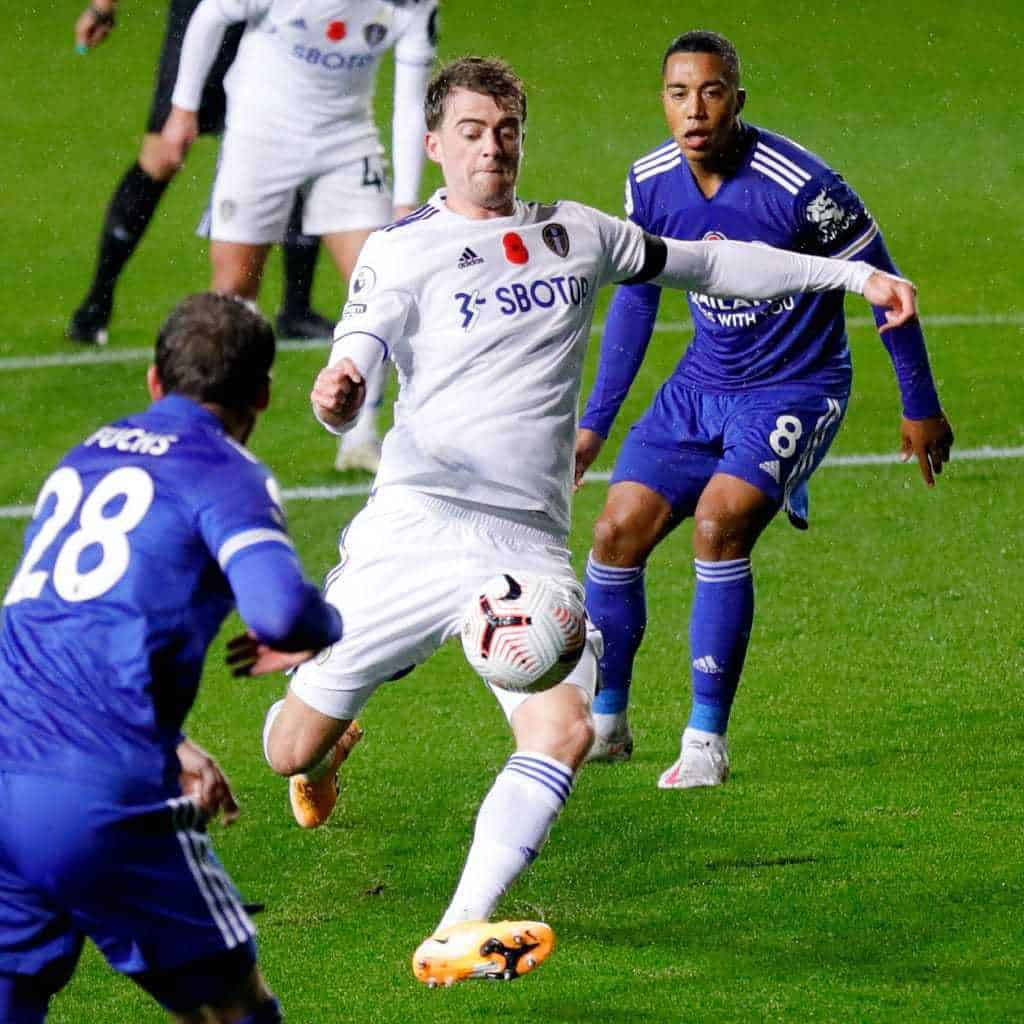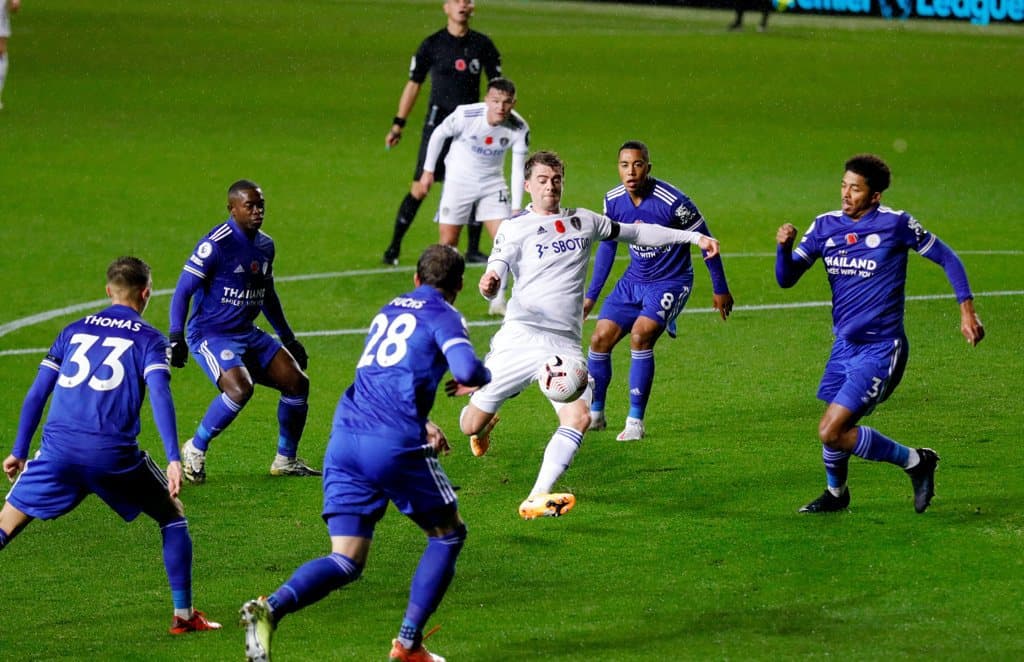Limited Time Discount! Shop NOW!

Remember when playing Leicester used to be fun?
They had spent all that money on Sven-Göran Eriksson and what had it got them? Nigel Pearson again, that’s what, glowering on the touchline as if he would rather headbutt a bear than carry on letting Jermaine Beckford treat a game at Elland Road like a lap of honour. It didn’t matter that, in the end, Danny Webber’s late equaliser for us was usurped by Harry Panayiotou’s even later winner for them. These were teams destined for mid-table in the Championship, and Beckford sending the ball wide with a whoopsy-daisy shrug to the Kop was as much entertainment as we ever got.
There’s supposed to be a limit to what a striker can achieve after arriving late in the professional game from non-league and signing for Leicester. Jamie Vardy’s Premier League winner’s medal and seven goals for England suggest otherwise. Vardy wouldn’t think twice about sticking in chances against a former club, even if his own grandma was in goal, even if he had to crack her with an elbow to do it. Score first, apologise later. After you’ve celebrated.
Vardy grabbed so much of the attention on Monday night at Elland Road that even after he’d been substituted he was part of the plot of Leicester’s stoppage time penalty, sitting in the stands, trying desperately to come up with a loophole that would allow him back on the pitch to take it. Instead Youri Tielemans put it in, making the score 4-1 and ending the night with one goal more than Vardy. You can imagine the striker’s frustration.
He’d set up the first for Harvey Barnes by seizing on Robin Koch’s damp back pass, tying Illan Meslier up in his arms and legs and giving his teammate an open goal, after just two minutes. Then he made the second happen by running in front of Koch, who stumbled in his wake, and nodding a near post header that Meslier kept out — Tielemans was there for another open goal. The third goal was Vardy’s, from James Maddison’s through ball, that Cengiz Ünder lifted over Meslier and Stuart Dallas’ sliding bodies so Vardy had an open goal of his own. And that was how the game was won.

With the East Stand’s upgraded floodlights shining on one striker in blue, the striker in white was deep in his shadow. Last week Pat Bamford was following his own euphoric late-arrival’s trajectory, a 27-year-old erasing his underwhelming Premier League past, goals at Anfield and hat-tricks at Villa Park putting him on course for England caps. He had, as many people said after his performance against Aston Villa, proved the doubters wrong once and for all.
But football doesn’t let you write your own story that way. In the second minute, Helder Costa’s cross was headed into the six yard box by Jackie Harrison, and Bamford was unmarked with only Kasper Schmeichel to beat. Schmeichel caught his tame header and ten seconds later City were in the lead and ready to embark on their plan to defend it. And every good thing Bamford has ever done was buried by ten game-changing seconds because football is like that, it’s cruel and unfair.
He had another first half chance, put into the penalty area by his own clever run and Luke Ayling’s inspired chip, but his first touch gave the ball to Schmeichel; and in the second half, running for a 50/50 with Schmeichel on the edge of the penalty area, it became 70/30 by the time the keeper cleared. Hovering at the other end of the pitch, Vardy must have hungered for those chances, thinking he could have scored that hat-trick, then got his own goal and assists, and still gone home unhappy about the penalty.
The penalty is the lesson. The point is not for Bamford to become Vardy: he never will, and he is the player he is, with his own virtues and value. The point is that you can never win at football. Vardy’s perfect night was spoiled by a chance he didn’t know was coming. In an interview with Donald McRae this week Marco van Basten talked about winning his third Ballon D’Or in 1992 then, two years later, crawling to his bathroom in excruciating pain, his career ended aged 28 by an ankle injury. Unless a striker can so arrange it that they score a hat-trick with their final three touches in the last three seconds of their last match, there is always the next moment, the next bounce of the ball, the chance of the fourth goal being screwed hopelessly wide, leaving everyone with the lasting memory of the one you missed.
Even Vardy’s story isn’t over: football never ends and is always trying to beat you next time. He’ll probably triumph because he plays that way, as if he never wants anyone to get away with criticising him ever. Writing about Bamford’s hat-trick last week, I mentioned three provocations leading to three goals, as if Bamford was answering questions: would he have tried for the top corner for his second, if Tyrone Mings hadn’t shaken him by the neck a minute earlier? Vardy seems to walk onto the pitch with revenge already on his mind. Perhaps Bamford should be locked for twenty minutes in a room with a tape recording of Sean Dyche to get him ready for those second minute headers.
The terror of the next game is also the hope: that Bamford can go to Selhurst Park on Saturday and put himself back on top of the world with more goals. We can hope that there, too, Jamie Shackleton will have learned from his anonymous first half; and further ahead, that Robin Koch will be better prepared for Jamie Vardy next time. Koch was the striker’s other victim; the free defender in United’s defence, he was sent reeling whenever Vardy’s movement took him out of Liam Cooper’s clutches, and left floundering by the pace employed when Vardy went running right at him. If Bamford was in the shadows, Koch was caught in the glare.
Marcelo Bielsa said afterwards that he had started with his system all wrong, and maybe the hope there is that he’ll put more trust in his instincts in the Premier League. Letting Mateusz Klich continue in combination with Shackleton was the fair thing to do after their second half at Villa Park, but what happened to that relaxed shrug when Kalvin Phillips was injured, that said Pascal Struijk would play and the transition would be seamless? Leeds were second to loose balls, slow to tackles and, if they had the ball, too willing to give it to City. Too many players looked too far from their usual business.
Full faith in the Villa result would also have kept Luke Ayling at centre-back, but Cooper’s return meant the defence was twisted away from that good clean sheet. Then, Rodrigo had to isolate himself from the attack due to a risk of coronavirus exposure, tugging the team further away from the Villa Park shape. Rodrigo’s absence, Raphinha’s bad ankle and Diego Llorente’s groin strain, while frustrating, are reminders that places remain up for grabs in this team.
At the start of the second half, 2-0 down, Bielsa brought Ian Poveda on in place of Shackleton and went for the game with a freakshow formation. One of the joys of Bielsa’s management is that Leeds are never out of any game and they came close to stealing this one. Stuart Dallas was lucky, swinging a cross from a short corner that evaded everyone and went in. There was no luck left for Pablo Hernandez, whose exquisite first touch, shimmy and shot deserved more than a crossbar spank.
Hernandez left the pitch in a funk when Tyler Roberts replaced him but the change that put the match back in Leicester’s grasp had already been made. Leeds were all wing, with Costa, Harrison and Dallas overloading one side, Poveda, Hernandez or Roberts and Ayling on the other. So Brendan Rodgers, tactically efficient behind his nails down a chalkboard demeanour, brought on England international playmaker James Maddison to sit in the centre circle and wait. While United were playing cat’s cradle trying to get the ball to Bamford at one end, when the ball came to Maddison, he had wide open fields to play in, Vardy running through them like Theresa May. The third goal came that way and the fourth, the penalty, felt unnecessary.
That reminds me of the other reason that playing Leicester used to be fun. They weren’t very good. They are now. Leeds, after two seasons of dominating the Championship and an attention grabbing start in the Premier League, will have to get used to things like that. There are stories in this division that began long before Leeds arrived and they have the weight of momentum. Leeds have to remember not to think their last game has defined them. It’s the next one that counts. ◉
£16.00
£9.00
Copyright © The Square Ball Media Limited All Rights Reserved
WordPress Development By Clio Websites